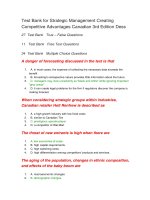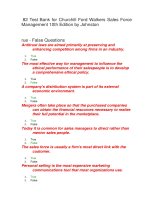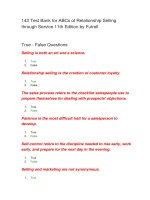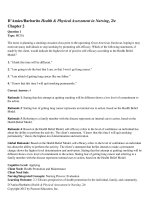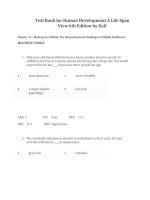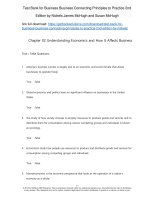Test bank for health and physical assessment in nursing 3rd edition by du2019amico
Bạn đang xem bản rút gọn của tài liệu. Xem và tải ngay bản đầy đủ của tài liệu tại đây (362.26 KB, 7 trang )
Instant download Test Bank for Health and Physical
Assessment In Nursing 3rd Edition by D’Amico:
CLICK HERE
Chapter 10
Question 1
Type: MCSA
The nurse is entering the room to assess a newly admitted client. Which best
describes the purpose for a general survey that is conducted prior to
beginning the physical assessment?
1.
2.
3.
4.
Allows for vital signs prior to starting exam.
Provides an opportunity for the client to relax before the exam.
Yields information to guide the physical assessment.
Provides the information necessary for the diagnosis.
Correct Answer: 3
Rationale 1: Vital signs are not part of the general survey. The general survey
consists of four major observations: physical appearance, mental status,
mobility, and behavior.
Rationale 2: The purpose of the general survey is to allow the nurse the
opportunity to gather clues to guide the rest of the assessment; the purpose is
not to give the client an opportunity to relax.
Rationale 3: The general survey allows the nurse to observe the client and
gain clues to guide the remainder of the assessment.
Rationale 4: The general survey does not provide the necessary information
to identify client problems or nursing diagnoses, but rather serves as a guide
for a more detailed assessment.
Global Rationale: The general survey allows the nurse to observe the client
and gain clues to guide the remainder of the assessment. Vital signs are not
part of the general survey. The purpose of the general survey is to allow the
nurse the opportunity to gather clues to guide the rest of the assessment; the
purpose is not to give the client an opportunity to relax. The general survey
consists of four major observations: physical appearance, mental status,
mobility, and behavior. The general survey does not provide the necessary
information to identify client problems or nursing diagnosis, but rather serves
as a guide for a more detailed assessment.
Cognitive Level: Understanding
Client Need: Health Promotion and Maintenance
Client Need Sub:
QSEN Competencies: III.A.5. Explain the role of evidence in determining
best clinical practice.
AACN Essentials Competencies: IX.1. Conduct comprehensive and
focused physical, behavioral, psychological, spiritual, socioeconomic, and
environmental assessments of health and illness parameters in patients, using
developmentally and culturally appropriate approaches.
NLN Competencies: Knowledge and Science: Relationships between
knowledge/science and quality and safe patient care.
Nursing/Integrated Concepts: Nursing Process: Assessment
Learning Outcome: 10.1: Identify the components of the general survey.
MNL Learning Outcome:
Page Number: p. 158
Question 2
Type: MCSA
The nurse observes the client walking into the room and climbing up on the
exam table. The nurse notes this activity to obtain data related to which item?
1.
2.
3.
4.
Mobility status.
Subjective assessments related to ambulation.
Activity tolerance.
Strength of upper and lower extremities.
Correct Answer: 1
Rationale 1: During a general survey, the nurse observes the client
performing routine activities, such as walking and sitting. This allows the nurse
to begin to gather data about the client’s mobility. These data will then be
incorporated into the remainder of exam and history.
Rationale 2: Observation is an objective assessment.
Rationale 3: Activity tolerance is not a component of the general survey. The
general survey consists of physical appearance, mental status, mobility, and
behavior.
Rationale 4: Watching the client walk and sit gives the nurse information
about the strength of a client’s lower extremities, but tells the nurse nothing
about the client’s upper extremity strength.
Global Rationale: During a general survey, the nurse observes the client
performing routine activities, such as walking and sitting. This allows the nurse
to begin to gather data about the client’s mobility. These data will then be
incorporated into the remainder of exam and history. Observation is an
objective assessment. Activity tolerance is not a component of the general
survey. The general survey consists of physical appearance, mental status,
mobility, and behavior. Watching the client walk and sit gives the nurse
information about the strength of a client’s lower extremities, but tells the
nurse nothing about the client’s upper extremity strength.
Cognitive Level: Applying
Client Need: Health Promotion and Maintenance
Client Need Sub:
QSEN Competencies: III.A.5. Explain the role of evidence in determining
best clinical practice.
AACN Essentials Competencies: IX.1. Conduct comprehensive and
focused physical, behavioral, psychological, spiritual, socioeconomic, and
environmental assessments of health and illness parameters in patients, using
developmentally and culturally appropriate approaches.
NLN Competencies: Knowledge and Science: Relationships between
knowledge/science and quality and safe patient care.
Nursing/Integrated Concepts: Nursing Process: Assessment
Learning Outcome: 10.1: Identify the components of the general survey.
MNL Learning Outcome:
Page Number: p. 158
Question 3
Type: MCMA
The nurse is assessing an adult client. Which observations should the nurse
include when documenting the general survey of this client?
Standard Text: Select all that apply.
1.
2.
3.
4.
Blood pressure 112/68, pulse 68, 98.6°F, respiratory rate 16.
Thin, well-nourished male client, appears younger than stated age.
Client moves about exam room without difficulty.
Abdomen flat, nondistended, bowel sounds present, nontender on
palpation.
5. Pain rating of 3 on a 0 to 10 scale.
Correct Answer: 2, 3
Rationale 1: The vital signs are objective information, but not part of the
actual general survey.
Rationale 2: The general survey is composed of four major categories of
observation: physical appearance, mental status, mobility, and behavior of the
client. The documentation thin, well-nourished male client, appears younger
than stated age reflects the client’s physical appearance, one of the
components of the general survey.
Rationale 3: The documentation client moves about exam room without
difficulty describes the client’s overall mobility, another component of the
general survey.
Rationale 4: The documentation abdomen flat, nondistended, bowel sounds
present, nontender on palpation is specific to the abdominal assessment and
not part of the general survey.
Rationale 5: A pain assessment is not included in the general survey of the
client.
Global Rationale: The general survey is composed of four major categories
of observation: physical appearance, mental status, mobility, and behavior of
the client. The documentation thin, well-nourished male client, appears
younger than stated age reflects the client’s physical appearance, one of the
components of the general survey. The documentation client moves about
exam room without difficulty describes the client’s overall mobility, another
component of the general survey. The vital signs are objective information, but
not part of the actual general survey. The documentation abdomen flat,
nondistended, bowel sounds present, nontender on palpation is specific to the
abdominal assessment and not part of the general survey. A pain assessment
is included when assessing the client’s vital signs.
Cognitive Level: Applying
Client Need: Health Promotion and Maintenance
Client Need Sub:
QSEN Competencies: III.A.5. Explain the role of evidence in determining
best clinical practice.
AACN Essentials Competencies: IX.1. Conduct comprehensive and
focused physical, behavioral, psychological, spiritual, socioeconomic, and
environmental assessments of health and illness parameters in patients, using
developmentally and culturally appropriate approaches.
NLN Competencies: Knowledge and Science: Relationships between
knowledge/science and quality and safe patient care.
Nursing/Integrated Concepts: Nursing Process: Assessment
Learning Outcome: 10.2: Apply the general survey to the comprehensive
health assessment.
MNL Learning Outcome:
Page Number: pp. 158–159
Question 4
Type: MCSA
The nurse is preparing to assess a client’s mental status within the general
survey. Which data should the nurse use to assess this status?
1. Noting of the number of times the client looks to significant other while
answering interview questions.
2. Asking the client to describe elements of his health history.
3. Studying the client’s clothing selections.
4. Noticing the client’s ability to make eye contact during the examination.
Correct Answer: 2
Rationale 1: Observing the client walking into the examination room would
help assess mobility.
Rationale 2: The general survey is composed of four major categories of
observation: physical appearance, mental status, mobility, and client behavior.
Asking the client to describe elements of his health history would help assess
mental status.
Rationale 3: Studying the client’s clothing selections would help assess
physical appearance.
Rationale 4: Noticing the client’s ability to make eye contact would help
assess client behavior.
Global Rationale: The general survey is composed of four major categories
of observation: physical appearance, mental status, mobility, and client
behavior. Asking the client to describe elements of his health history would
help assess mental status. Observing the client walking into the examination
room would help assess mobility. Studying the client’s clothing selections
would help assess physical appearance. Noticing the client’s ability to make
eye contact would help assess client behavior.
Cognitive Level: Applying
Client Need: Health Promotion and Maintenance
Client Need Sub:
QSEN Competencies: III.A.5. Explain the role of evidence in determining
best clinical practice.
AACN Essentials Competencies: IX.1. Conduct comprehensive and
focused physical, behavioral, psychological, spiritual, socioeconomic, and
environmental assessments of health and illness parameters in patients, using
developmentally and culturally appropriate approaches.
NLN Competencies: Knowledge and Science: Relationships between
knowledge/science and quality and safe patient care.
Nursing/Integrated Concepts: Nursing Process: Assessment
Learning Outcome: 10.2: Apply the general survey to the comprehensive
health assessment.
MNL Learning Outcome:
Page Number: pp. 158–159
Question 5
Type: MCSA
During an interview with an older adult client, the nurse notes the client is
confused as to day and time. The nurse documents this finding as an indicator
of which item?
1.
2.
3.
4.
Affect and mood.
Orientation.
Cooperation.
Level of anxiety.
